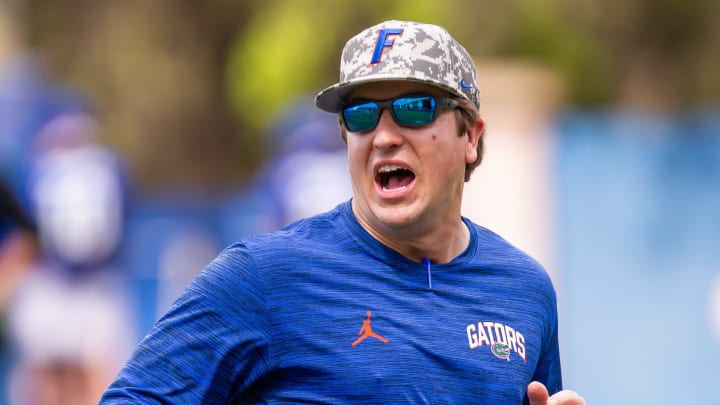Gators' TE Coach Russ Callaway Talks Role in Offense

Entering year three of the Billy Napier-era of the Florida Gators football program, there’s been plenty of change both within the roster and the coaching staff.
However, one change didn’t come from the outside. It came from an inward promotion.
After one season as the Gators’ tight ends coach, Russ Callaway took on more responsibility within the offensive scheme after being promoted to co-offensive coordinator in February. One of those expected responsibilities is having more input in the play-calling and design, which was inconsistent at times last season.
Despite rumors swirling and calls from fans for Callaway to take full control of the Gators’ play-calling, he said it’s a team-effort across the board.
“I think really it's overall a team effort,” he said on Tuesday. “When I got here a few years ago, I worked with Coach Napier in the past, Coach (Rob) Sale in the past, and I believe, and we believe it's about getting your players in the best situation possible.
“So I don't think I would necessarily put my own spin on it. It's really a team effort. It starts at the top with Coach Napier and Coach Sale and myself and all the other coaches we have on staff.”
That’s not to say, though, that Callaway can’t have a major impact on the offense despite not having the final say on plays. His greatest success came during his time with FCS Samford, where he spent four of his five years on staff as the offensive coordinator.
Known for an air-raid attack, Callaway led the Bulldogs to tremendous success in the passing game. In 2018, Samford led the FCS in passing (392.7 yards per game) and sixth in red zone offense (90.2%).
The Bulldogs were also top-15 nationally in the FCS in team passing efficiency (155.24), scoring (35.1 points per game) and total offense (446.2 yards per game). He wants to continue that success with Florida.
“Obviously you want to generate as many explosives as possible. Really that starts with really good players, to be honest with you,” he said. “We do have a very solid core coming back. We feel really good about the guys in the room -- quarterback room, receiver room, running back room. It goes back, again, week to week, what are we seeing that they're doing defensively, and how can we get the guys in the right spot to make them the most -- the best chance to succeed?”
A lot of the play-calling and scheme decisions will come on a week-to-week basis, Callaway said. However, the plan to get the ball into playmaker’s hands, namely sophomore wide receiver Eugene Wilson III, remains the same.
“We do a really good job, and we've done it in the spring, of tracking real time how many times Tre's touched it, how many times the running backs have touched it, the other receivers, so forth, and so on,” he said. “I think it's one of those things it's kind of the flow of the game. If we're rolling and Tre's touched it five times in the first half, okay, we're doing really good spreading the ball around. Or if it's not going great, then maybe we've got to maneuver a couple of things here or there.”
Callaway’s promotion isn’t the only play-calling-related change heading into the 2024 season. Nation-wide, programs can now use communication through quarterbacks’ helmets, similar to the style NFL teams use.
Callaway, although in favor of the change, is realistic with the struggles that could come with using the equipment.
“We're kind of still working through the kinks of it with camp because this is the first time that we've done it. I do think there will be some benefit with different ways that people get in the play calls,” he said. “However, there are certain backup plans you have to have in place if something were to go wrong with the headset on GameDay. Sometimes it will go out for a drive, maybe get you cut off. You've got to have different ways to get the play in.”
Despite the vast changes throughout the program, Callaway sees a difference in the culture of this year’s Gator squad. This was evident during the voluntary workouts in the offseason while the coaches were hosting recruiting weekends.
Not expecting any players to be on the field to be working out while visits were taking place, Callaway explained he saw many players from many different position groups participating in workouts.
“I looked at a couple of our coaches, and I said this is the difference in the team this year,” he said. “They want it. They got that Gator in them, and that's kind of what we've been preaching. To have that mentality and what we're looking for, the work ethic on and off the field, I really think this group has it.”
The 2024 Florida Gators will put that into practice throughout fall camp, which continues with a practice partially open to the media on Wednesday, in preparation for its season-opening matchup against Miami on Aug. 31.
